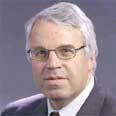

Ex-diplomat: Israeli officials don't want Syrian talks
Former Foreign Ministry director who was involved in talks with Syrian officials, slams gov't officials for denying knowledge of talks, attempt to downplay significance: 'There was a chance, the Syrians were interested – but Israel wouldn't meet with them'
Ex-director of the Ministry of Foreign Affairs Dr. Alon Liel on Thursday slammed Prime Minister Ehud Olmert's statements denying any knowledge of talks between Israeli and Syrian officials.
"I won't name names, but these were not low-level figures (who were informed of the talks), and it wasn't only one senior official but five," said Liel.
"There was an opportunity, I applied enormous pressure – but the answer I received was negative," he stressed.
Liel, who for months was involved in secret negotiations with Syrian officials, spoke on Thursday at a conference held by the Center for Strategic Dialogue at the Netanya Academic College.
According to Liel on the 12th day of fighting in Lebanon the two sides met for the last time. "The Syrians said that now there was a state of emergency because of the war, and offered to hold open talks on high levels with an American representative in the room," said Liel.
Liel also added that the Syrians were willing to meet immediately with Israeli government officials.
"I came back home and told senior Israeli officials about the Syrian's readiness to meet. I pushed and the answer I got was no," he said, "I said that there is an opportunity now, during the war, and that Syria influences Hizbullah. I applied enormous pressure, not hallway conversations, but the answer that I got was 'we don't want to meet with them'.
'We tried everything'
Liel also addressed the government's standing following the war: "The war weakened Israel and strengthened the American authority. UN resolution 1701 is an American resolution and the government owes a lot to the Americans. It's gotten harder since the war to say no to Washington. We have a prime minister who's weak at the moment in terms of what he can do in the face of American pressure."
Regarding the agreements he reached with the Syrians, Liel said: "We tried everything, including a land exchange that would allow us to keep most of the Golan Heights while the Syrians would get alternative land from Jordan who in turn would get Israeli land from the Arava. The Turks made it clear to us that Syria is not interested. They told us to forget it and we dropped the subject."
"From the beginning we explained to the Syrians that Israel cannot withdraw simultaneously from both the Golan Heights and Gaza, at the time the disengagement was on the agenda. We told them that we can’t enter the public arena as long as we have the disengagement to deal with and I believe that the Syrians understood this. However, it has already been six months since Olmert abandoned his realignment plan."
Liel: Assad is serious, but can't abandon Iran
Dr. Liel later addressed the earnestness of the Syrian president's intentions in declaring his desire for peace with Israel. "We believe that Assad is serious," said Liel.
"He wants to talk for several reasons, and while not all of them are clear to us, he is very interested in launching negotiations. Despite this, the Syrians have made it clear to us that they can't begin negotiations from a position of isolation and that they cannot forgo their alliance with Iran as long as the West's isolation continues, he added.
"There is nothing preventing Syria from dropping their allegiance with Iran, they have no interest in it, but they have no choice since they are rejected by the United States and Europe," Liel concluded.
The American partner in the Syrian talks, Geoffrey Aronson, also spoke at the conference and concurred with Liel's observations regarding the sincerity of Syria's desire for negotiations.
Aronson said that he did not rule out the possibility that the talks were only a tactic designed to win over Washington. However, he said, based on the personal efforts exuded by both sides he is of the opinion that they have a serious reason to want to sit down for real negotiations.
Aronson said that another subject that was discussed was the establishment of a park which would be set up east of the border along the Kinneret, which both Israelis and Syrians would be free to access and which would be administrated by the Syrians.
He added that the matter of executed Israeli spy Eli Cohen and visitation rights for Syrians held in Israeli prisons and Israeli visits to Syria were also discussed.
According to Aronson there have not yet been talks regarding military borders or territorial marking of lands, excluding the talks of the Syrian park.
Aronson said that the security issues were beyond the groups' professional abilities and expertise, as well as having already been discussed in other forums.
The idea was to provide Israelis with access to the part and parts of the Golan Heights, said Aronson, should there be an agreement and the Golan would be transferred over to Syrian hands.
The Syrians have asked that should this be the case and Golan Heights would be transferred, the natural resources in the area will remain as they are. Aronson explained that the Syrians insisted that the Golan wineries remain as they are.
The timeframe for such a plan, according to Aronson, is between five and 15 years. Aronson added that the Syrians thought it would be an excellent idea to leave a corridor to the city of Katzerin which would be under Israeli control.
Roee Nahmias contributed to this report















